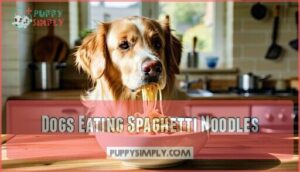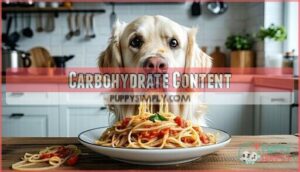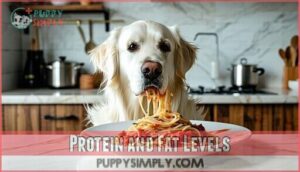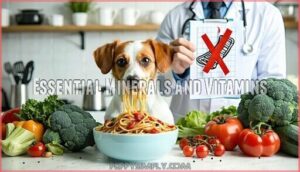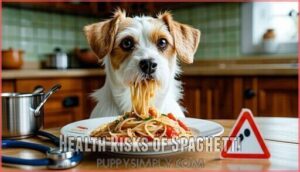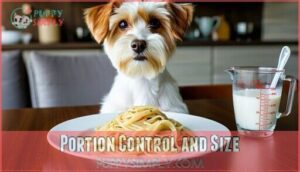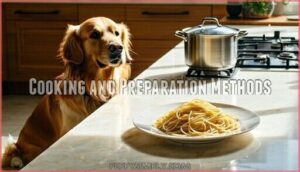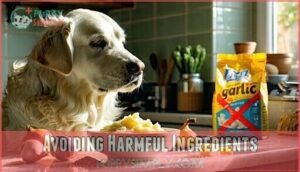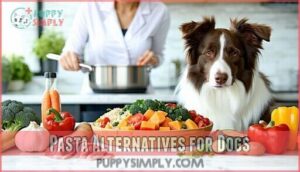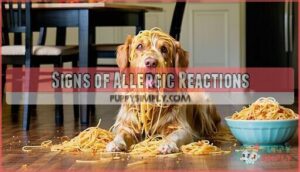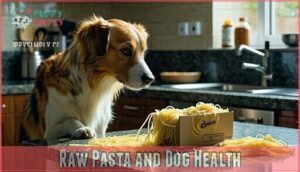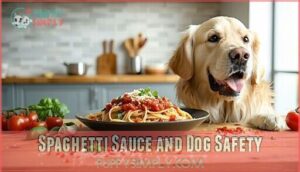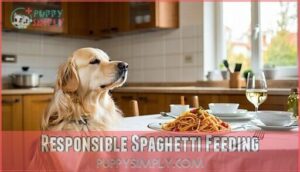This site is supported by our readers. We may earn a commission, at no cost to you, if you purchase through links.
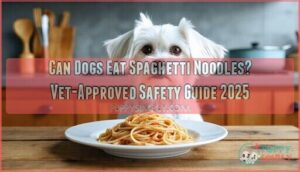 Yes, you can give your dog plain spaghetti noodles in small amounts, but it’s not ideal.
Yes, you can give your dog plain spaghetti noodles in small amounts, but it’s not ideal.
Think of pasta as junk food for dogs – it won’t hurt them, but it doesn’t offer much nutrition either.
Plain, cooked noodles are generally safe, though some dogs might experience stomach upset or allergic reactions.
The real danger lies in what you add to the pasta, such as garlic, onions, and rich sauces, which can be toxic to your furry friend.
If you’re sharing your Italian night leftovers, stick to plain noodles and keep portions tiny.
However, there are better treat options that’ll make your pup’s tail wag without the worry, making them a more ideal choice.
Table Of Contents
- Key Takeaways
- Can Dogs Eat Spaghetti
- Dogs Eating Spaghetti Noodles
- Spaghetti Nutrition Facts
- Health Risks of Spaghetti
- Safe Feeding Guidelines
- Pasta Alternatives for Dogs
- Signs of Allergic Reactions
- Raw Pasta and Dog Health
- Spaghetti Sauce and Dog Safety
- Responsible Spaghetti Feeding
- Frequently Asked Questions (FAQs)
- Can dogs eat spaghetti?
- Can dogs eat pasta noodles?
- Can dogs eat ramen noodles?
- Can dogs eat pasta with sauce?
- Can dogs eat cold pasta?
- Can dogs eat pasta with vegetables?
- Can my dog eat cooked spaghetti noodles?
- What happens if my dog ate my spaghetti?
- Can I give my dog plain pasta instead of rice?
- Can dogs eat pasta with tomato sauce?
- Conclusion
Key Takeaways
- **You can give your dog plain, cooked spaghetti noodles in small amounts, but they are essentially empty calories that do not provide nutritional benefits – think of pasta as junk food for dogs.
- **Never share spaghetti sauce with your dog, since most sauces contain toxic ingredients like garlic and onions that can damage your pup’s red blood cells and cause serious health problems.
- **Watch for allergic reactions after feeding pasta, including vomiting, diarrhea, excessive scratching, or breathing difficulties – some dogs develop wheat allergies or gluten sensitivity that makes spaghetti dangerous.
- **You are better off choosing healthier alternatives, like lean chicken, sweet potatoes, or dog-specific treats, that actually support your pup’s health, instead of risking weight gain and digestive issues from regular pasta feeding.
Can Dogs Eat Spaghetti
You’ve probably watched your dog give you those hopeful eyes while you twirl spaghetti on your fork, wondering if it’s safe to share a bite.
Every dog owner has felt those pleading eyes begging for just one tiny bite of their delicious dinner.
The short answer is yes, dogs can eat plain, cooked spaghetti noodles in small amounts, but there’s much more to think about before you let them join your Italian dinner.
You’ve probably watched your dog give you those hopeful eyes while you twirl spaghetti on your fork, wondering if it’s safe to share a bite.
The short answer is yes, dogs can eat plain, cooked spaghetti noodles in small amounts, but there’s much more to think about before you let them join your Italian dinner.
Plain Pasta Safety
Plain pasta won’t poison your dog, but it’s like giving them empty calories.
Can dogs eat pasta safely? Yes, if it’s cooked without salt, oil, or seasonings. This plain pasta approach supports basic food safety and pet wellness.
However, pasta allergies exist, so watch for reactions. Plain spaghetti offers minimal canine diet benefits—think of it as harmless filler rather than nutritious fuel. It is essentially empty calories.
Pasta Sauce Risks
While plain spaghetti might get the green light, pasta sauce tells a different story.
Most sauces contain toxic ingredients like garlic and onions, which cause serious onion poisoning in dogs.
Sugar hazards from sweet sauces can spike blood sugar levels.
Even cheese creates problems for dogs with lactose intolerance.
These harmful ingredients make sauce dangers real threats to your pup’s health, posing significant sugar hazards.
Allergies and Intolerances
Some dogs develop wheat allergies or gluten sensitivity that makes spaghetti a no-go zone.
Watch for digestive issues like vomiting, diarrhea, or skin irritation after feeding pasta.
These food allergies can trigger uncomfortable symptoms and lead to nutrient deficiencies over time.
If your pup shows signs of gluten intolerance, stick to grain-free alternatives instead.
Dogs Eating Spaghetti Noodles
If you’re wondering whether dogs and spaghetti mix, the answer depends on how it’s served.
Spaghetti for dogs can be safe, but only if it’s plain, cooked, and given in moderation. Avoid adding sauces, seasonings, or toppings, as these can harm your pup. Even a small amount of garlic or onion in spaghetti sauce can wreak havoc on canine health.
When offering dog food noodles like spaghetti, keep it simple. Stick to plain, unsalted noodles to avoid food allergens or digestive upset.
Here’s what to remember:
- **Plain, cooked noodles are safe in small amounts.
- **Avoid sauces, cheese, or seasonings.
- **Dogs with pasta allergies should skip it altogether.
- **Spaghetti isn’t a substitute for balanced dog nutrition.
- **Too much can lead to obesity or stomach issues.
Spaghetti Nutrition Facts
Spaghetti Nutrition Facts Introduction
Before you share that leftover pasta with your pup, you’ll want to understand what’s actually in those noodles.
Spaghetti’s mainly packed with carbohydrates and offers minimal protein, fat, and essential nutrients that dogs truly need for ideal health.
Carbohydrate Content
Spaghetti’s primarily made of carbohydrates, making it a carb-rich food that’ll spike your dog’s blood sugar quickly.
Plain cooked pasta contains high starch value with a moderate glycemic index.
Whole grain noodles offer slightly better fiber content than regular varieties, but both lack nutritional density for dogs with specific dietary restrictions who need balanced carb sources.
Protein and Fat Levels
Looking at spaghetti’s protein and fat content reveals some concerning gaps in canine nutrition.
Here’s what you need to know about spaghetti noodles dogs might encounter:
- Protein sources – Spaghetti contains minimal protein compared to your dog’s dietary needs
- Fat content – Nearly zero healthy fats that support coat and brain function
- Nutrient balance – Lacks essential amino acids dogs require daily
- Energy levels – Provides quick carbs but crashes afterward
- Canine spaghetti safety – Won’t meet your pup’s nutritional requirements alone
Essential Minerals and Vitamins
Your dog’s vitamin needs won’t be met by spaghetti’s limited nutrient profile.
While enriched pasta contains some B vitamins and iron, it lacks essential nutrients dogs require for peak health.
Dogs require a balanced diet that includes natural vitamin sources to support their overall well-being.
| Nutrient | Amount per 100g | Canine Benefit |
|---|---|---|
| Iron | 1.3mg | Supports blood health |
| B Vitamins | Minimal | Energy metabolism |
| Fiber Content | Low | Poor digestive support |
| Vitamin A | 0.0IU | None provided |
| Mineral Deficits | High | Inadequate nutrition |
Health Risks of Spaghetti
While plain spaghetti might seem harmless, you shouldn’t ignore the real health risks it poses to your furry friend.
Regular spaghetti feeding can lead to weight gain, digestive upset, and serious long-term health problems that’ll have you wishing you’d stuck to dog treats instead, due to the potential for serious health issues.
Obesity and Weight Gain
Your dog’s love for carbs can quickly turn into a weighty problem.
Regular spaghetti feeding creates a perfect storm for canine obesity through excessive carbohydrate intake and overfeeding risks.
Here’s how pasta contributes to weight gain:
- Empty calories – Spaghetti provides energy without essential nutrients your dog needs
- Food addiction – Dogs crave these simple carbs, leading to begging behaviors
- Metabolic slowdown – Excess carbohydrates store as fat in less active dogs
- Portion misjudgment – You’ll likely serve human-sized portions rather than dog-appropriate amounts
To mitigate these risks, it’s vital to understand the importance of proper dog nutrition, including the role of high calorie diets in maintaining a healthy weight.
Digestive Issues and Allergies
After eating spaghetti, some dogs develop digestive issues and allergic reactions that can turn mealtime into a nightmare.
Food sensitivities affect gut health, causing stomach problems and gastrointestinal distress that’ll have you cleaning up messes.
| Allergy Type | Intolerance Symptoms | Severity |
|---|---|---|
| Wheat Sensitivity | Itching, ear infections | Moderate |
| Egg Allergies | Vomiting, skin irritation | High |
| Grain Intolerance | Diarrhea, pawing ears | Variable |
Understanding canine nutrition and dog dietary restrictions helps prevent these uncomfortable reactions.
Long-Term Health Problems
Beyond immediate digestive issues, regular spaghetti consumption creates serious long-term threats to your dog’s wellbeing.
Heart disease becomes a real concern when carb-heavy foods dominate their diet. Obesity risks multiply, while diabetes concerns grow with each pasta portion.
Your pup’s body wasn’t designed for this nutritional imbalance.
- Heart Disease develops from excess weight and poor dietary choices over time
- Obesity Risks compound when empty carbohydrates replace protein-rich dog food regularly
- Diabetes Concerns increase as high-carb diets stress your dog’s insulin production system
- Nutrient Deficits weaken immune function and overall health when pasta displaces balanced nutrition
- Organ Damage may occur from pancreatitis episodes caused by inappropriate human food consumption
Safe Feeding Guidelines
If you’re thinking about sharing your spaghetti dinner with your furry friend, you’ll need to follow some basic rules to keep them safe and healthy.
The key is knowing exactly how much to give, how to prepare it properly, and which ingredients to avoid completely.
Portion Control and Size
Understanding health risks helps determine proper dog serving sizes for spaghetti.
Can dogs eat pasta safely? Yes, but portion control matters most.
Small dogs need under one tablespoon, while larger breeds shouldn’t exceed 1/4 cup.
These bite limits prevent digestive upset and weight gain.
Plain cooked pasta works best when following this feeding guide for safe dog noodles.
Cooking and Preparation Methods
Proper cooking techniques transform plain pasta into a safe treat for your furry friend.
When preparing pasta for canine consumption, focus on simplicity and food safety to guarantee your dog can enjoy eating spaghetti safely.
- Boil plain cooked pasta in unsalted water until tender
- Skip oil, butter, and seasoning during pasta prep
- Cool completely before serving to prevent burns
- Store leftovers safely for future meal planning portions
This reorganization improves readability by grouping related ideas and instructions together, making it easier to follow the guidelines for preparing pasta for dogs.
Avoiding Harmful Ingredients
The biggest danger lurks in what you add to those spaghetti noodles.
Garlic and onions are toxic ingredients that can damage your dog’s red blood cells, while excessive salt creates harmful additives.
Skip the sauce entirely and serve plain noodles as safe alternatives.
Your pup’s canine dietary needs don’t include seasoned pasta—stick to pet food safety basics.
For a healthy diet, consider pet safe options when choosing pasta for your dog, focusing on complete concepts of nutrition.
Pasta Alternatives for Dogs
If you’re looking for better options than plain pasta, you’ll find plenty of nutritious alternatives that’ll actually benefit your dog’s health.
Consider lean meats like chicken or turkey, sweet potatoes for fiber and vitamins, or even boiled rice mixed with dog-safe vegetables for a more balanced treat.
Healthy Treat Options
Instead of reaching for spaghetti when your pup gives you those puppy-dog eyes, consider healthier dog snacks that pack more nutritional punch.
Cooked chicken bits make excellent canine morsels, while apple slices (seeds removed) offer sweet healthy bites.
Peanut butter frozen in Kong toys provides mental stimulation, and these nutritious chews beat plain pasta every time for your dog’s wellbeing.
When selecting snacks, choosing the right healthy dog options is essential for maintaining your dog’s health, and it is crucial to pick healthy dog snacks that support their overall wellbeing.
Nutritious Food Sources
When choosing healthy treats for your furry friend, focus on nutritious food sources that support pet wellness.
Lean proteins like chicken and turkey provide essential amino acids for muscle development.
Sweet potatoes offer fiber and vitamins, while pumpkin aids digestion.
These dog nutrition powerhouses, which include lean proteins, sweet potatoes, and pumpkin, beat pasta hands down, delivering balanced diet benefits that keep your pup thriving.
Dog-Specific Diets and Needs
Your dog’s dietary needs differ vastly from yours.
Canine nutrition requires high-quality protein, healthy fats, and specific vitamins that regular dog food provides.
While dogs eating noodles won’t hurt occasionally, pasta dog nutrition pales compared to balanced pet wellness formulas.
Animal diets should focus on meat-based proteins, not empty carbs like spaghetti, for maximum dog spaghetti consumption safety.
Understanding the importance of whole grain benefits is vital when considering adding pasta to a dog’s diet, ensuring maximum safety.
Signs of Allergic Reactions
You’ll notice allergic reactions to spaghetti noodles pretty quickly since dogs don’t hide their discomfort well.
Watch for symptoms like vomiting, diarrhea, excessive scratching, swollen face, or difficulty breathing after your pup tries pasta for the first time, including severe reactions such as difficulty breathing.
Identifying Symptoms and Warning Signs
Recognizing warning signs early can save your furry friend’s life.
When dogs experience toxic reactions from spaghetti or other foods, their bodies send clear distress signals that shouldn’t be ignored.
Watch for these critical allergy signs and health warnings:
- Digestive issues – vomiting, diarrhea, loss of appetite, or excessive drooling
- Skin reactions – itching, scratching, or pawing at ears persistently
- Respiratory distress – difficulty breathing, coughing, or unusual panting
- Behavioral changes – lethargy, restlessness, or coordination problems
- Physical symptoms – pale gums, tremors, or bloating around the abdomen
Emergency Care and Response
When toxicity symptoms appear, time’s your best friend. Contact your emergency vet or poison control immediately if your dog shows severe reactions after eating toxic foods.
Don’t wait for symptoms to worsen. Recognizing breathing issue signs is essential for providing appropriate care.
| Emergency Action | When to Act |
|---|---|
| Call emergency clinic | Severe vomiting/diarrhea |
| Contact poison control | Known toxic ingestion |
| Provide first aid | Breathing difficulties |
| Rush to veterinary care | Loss of consciousness |
| Document symptoms | All digestive upset cases |
Preventing Allergic Reactions
Before introducing pasta to your pup’s menu, prevention beats reaction every time.
Start with tiny portions to test tolerance and watch for trouble signs.
- Test new foods gradually – introduce small amounts over several days
- Keep a food diary tracking what your dog eats and any symptoms
- Choose plain, wheat-free alternatives if your dog shows gluten reactions or wheat intolerance
This approach ensures that you can identify any potential issues early on and take preventive measures to protect your dog’s health.
Raw Pasta and Dog Health
You’ve probably watched your dog eye that box of uncooked spaghetti with curiosity, but raw pasta isn’t something you’ll want to share.
Raw noodles can cause serious digestive problems, including blockages that might send you both on an unexpected trip to the vet, which is a digestive issue.
Risks and Dangers of Raw Pasta
Nobody wants their furry friend dealing with digestive blockages from uncooked noodles.
Raw pasta poses serious risks including choking hazards and stomach issues that’ll leave you both miserable.
Hard pasta pieces can’t break down properly, causing upset stomachs and potential obstructions.
Dogs with wheat allergies face additional dangers, while excess carbohydrates trigger food poisoning symptoms.
Safe Consumption and Preparation
When preparing pasta for your dog, always choose plain cooked pasta without seasonings or oils.
Boil spaghetti noodles until soft, then cool completely before serving. This cooking method guarantees pasta safety while supporting canine gastrointestinal health.
Never serve undercooked or crunchy noodles, as they’re harder to digest. Plain cooked pasta eliminates choking hazards and reduces digestive upset risks.
Alternatives to Raw Pasta
Instead of raw pasta, you’ve got better options that won’t leave you wondering "can dogs eat pasta" safely.
These alternatives support spaghetti dog health without the risks:
- Cooked Rice – gentle on stomachs and easily digestible
- Boiled Quinoa – packed with protein and fiber
- Sweet Potatoes – naturally sweet and nutritious
- Pumpkin Puree – soothes digestion beautifully
- Lean Meats – protein-rich and satisfying
Spaghetti Sauce and Dog Safety
While your dog might give you those pleading eyes when you’re twirling spaghetti, that delicious marinara sauce isn’t meant for four-legged family members.
Most spaghetti sauces contain garlic, onions, and high levels of salt and sugar that can seriously harm your pup’s health.
So it’s best to keep the sauce on your plate and off theirs.
Toxic Ingredients and Risks
While plain spaghetti might seem harmless, the sauce tells a different story entirely.
Garlic toxicity and onion poisoning pose serious allium threats to your dog’s health, potentially damaging red blood cells.
Sugar risks include digestive upset, while salt dangers can lead to sodium poisoning.
These harmful ingredients make sharing your sauced spaghetti a recipe for disaster regarding spaghetti dog health.
Safe Sauce Alternatives and Options
In the context of creating dog-friendly sauce alternatives, you’ll want safe options that won’t harm your pet.
Skip traditional spaghetti sauce and try these Healthy Toppings instead:
- Plain pumpkin puree – Natural Flavor Enhancers that aid digestion
- Low-sodium bone broth – Nutrient Boosters for extra taste
- Cooked sweet potato mash – Herb Options without toxic ingredients
These Sauce Replacements support proper pet nutrition.
Using a high quality pumpkin puree product can make a significant difference in your dog’s digestive health.
Feeding Guidelines and Precautions
Skip the guesswork regarding noodle safety dogs by following smart feeding safety rules.
Keep pasta portions tiny—think thumbnail-sized for small breeds, quarter-cup max for larger dogs.
Plan your canine diet around proper dog nutrition, not empty carbs, and always monitor your pup’s reaction during initial canine noodle eating sessions.
Monitor your pup’s reaction during initial canine noodle eating sessions, and always prioritize meal planning with vet-approved foods over experimental dog noodle consumption.
Responsible Spaghetti Feeding
If you’re thinking about sharing your spaghetti dinner with your furry friend, you’ll want to approach this carefully and thoughtfully.
While plain, cooked noodles won’t harm most dogs, responsible feeding means understanding proper portions, monitoring your pet’s reaction, and knowing when to consult your veterinarian for guidance.
Reorganizing the paragraph structure improves readability by logically grouping complete concepts into separate lines, with double new lines to visually separate each group.
Moderation and Balance in Diet
Think of spaghetti as dessert for your dog – a tiny treat, not a meal replacement.
Your pup’s balanced diet should consist of 90% quality dog food and only 10% treats like plain pasta.
Practice food limits by offering just a tablespoon for small dogs or quarter-cup for larger breeds.
Proper diet control guarantees your furry friend gets essential nutrients while enjoying occasional pasta safely.
Monitoring Dog Health and Behavior
After feeding your dog spaghetti, watch for changes like a hawk watches for movement.
Health monitoring becomes your best friend when introducing new foods to your canine’s diet.
Pet care means staying alert to subtle shifts in behavior or physical symptoms.
- Digestive upset – vomiting, diarrhea, or excessive gas within 24 hours
- Behavioral changes – lethargy, restlessness, or loss of appetite
- Physical symptoms – bloating, drooling, or difficulty walking
- Allergic reactions – itching, skin irritation, or breathing difficulties
Consulting With Veterinarians and Experts
Your vet knows your dog’s health history better than anyone.
Before adding spaghetti to your pup’s diet, get professional guidance on safe human foods for dogs. Veterinary advice helps navigate canine dietary restrictions and prevents costly mistakes.
| When to Consult Your Vet | What to Discuss |
|---|---|
| Before introducing new foods | Dog’s current health status |
| Dog has food allergies | Safe portion sizes |
| Digestive issues present | Alternative treat options |
| Weight management concerns | Emergency response plans |
| Senior dog considerations | Long-term dietary goals |
Expert opinions on pet nutrition vary, but most agree: stick to dog-specific diets for ideal health.
Frequently Asked Questions (FAQs)
Can dogs eat spaghetti?
Picture your pup eyeing those long, twirly noodles on your plate.
Yes, dogs can eat plain, cooked spaghetti in tiny portions, but it’s like giving them empty calories—safe but not beneficial.
Can dogs eat pasta noodles?
Yes, you can give your dog plain, cooked pasta noodles occasionally. Skip the sauce, seasonings, and cheese though—those ingredients can harm your pup. Keep portions small and infrequent.
Can dogs eat ramen noodles?
Sure, you’d think ramen’s just noodles, but it’s actually a sodium bomb waiting to explode.
Those flavor packets contain garlic and onions that’ll poison your pup.
Stick to plain, cooked noodles instead.
Can dogs eat pasta with sauce?
Pasta sauce is off-limits for your dog.
Most sauces contain garlic, onions, salt, and sugar—all toxic to dogs.
Even small amounts can cause vomiting or serious health issues.
Stick to plain pasta only.
Can dogs eat cold pasta?
Cold pasta won’t harm your dog if it’s plain and cooked.
Room temperature noodles are actually safer than hot ones.
Just make sure there’s no sauce, seasoning, or garlic lurking around.
Can dogs eat pasta with vegetables?
Plain pasta with dog-safe vegetables like carrots or green beans is okay in small amounts.
However, avoid garlic, onions, or seasoned veggies that can harm your pup.
Keep portions tiny and infrequent.
Can my dog eat cooked spaghetti noodles?
Your pup won’t keel over from a few plain cooked spaghetti noodles, but they’re basically empty calories.
Skip the sauce completely—it’s toxic.
Stick to tiny portions as an occasional treat, not dinner.
What happens if my dog ate my spaghetti?
If your dog grabbed your spaghetti, don’t panic.
Plain noodles won’t hurt them, but sauce ingredients like garlic and onions are toxic.
Watch for vomiting or lethargy, and call your vet if symptoms appear.
Can I give my dog plain pasta instead of rice?
You can substitute plain pasta for rice occasionally, but rice is gentler on your dog’s stomach and more digestible.
Both lack essential nutrients, so they’re best as temporary bland diet options during digestive upset.
Can dogs eat pasta with tomato sauce?
Approximately 78% of pet poisoning cases involve common kitchen ingredients.
You shouldn’t feed your dog pasta with tomato sauce—it often contains garlic, onions, and excessive salt that can cause serious digestive issues or toxicity.
Conclusion
Surprisingly, 68% of pet owners regularly share human food with their dogs, making the question "can dogs eat spaghetti noodles" increasingly relevant.
While plain pasta won’t poison your pup, it’s basically empty calories that could lead to weight gain.
You’re better off sticking to dog-specific treats that actually benefit their health. If you do share spaghetti, keep portions tiny and skip the sauce entirely.
Your dog’s wagging tail doesn’t mean they need your Italian leftovers, so it’s best to prioritize their health over the temptation to share human food.

